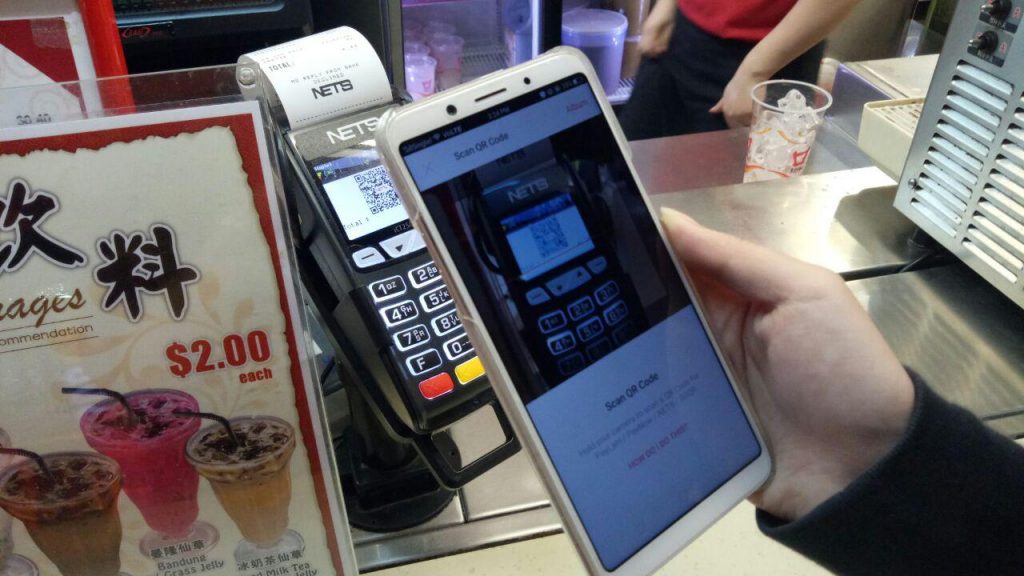
Mr Lee Kok Hoong is a 53-year-old mechanic who does not have a single mobile wallet or digital payment app on his Oppo R11s.
It’s not because he isn’t tech-savvy. For one thing, he finds Visa Paywave even more convenient than mobile wallets. All he needs to do is “tap and go”. There’s no need to key in a PIN. There’s also no need to transfer money from the savings account to the mobile wallets.
Secondly, he is not confident about the security of mobile wallets. “They’re not really safe since our phones do not have antivirus software,” Mr Lee said, citing worries that his banking information could be compromised due to security breaches or loss of device.
On the flipside, Ms Sherry Chio, a 25-year-old makeup artist is a big fan of mobile wallets. She started using DBS PayLah! 2 years ago when the QR code transaction feature was first introduced.
PayLah! is one of the most widely used mobile wallets in Singapore with more than one million users as of December 2018. Users can make transactions such as QR code payments, bill payments, or funds transfer to one another via a mobile number, also known as person-to-person (P2P) payments.
“Mobile wallets make it a lot easier [for me] to pay my friends back as I don’t have to go through the hassle of traditional bank transfers,” said Ms Chio.
But she said she still has concerns about the security aspect, so she makes sure she has no more than $100 in her mobile wallet at any point in time.
Mr Anthony Seow, Head of Payments & Platforms at DBS, however, reaffirms the security of mobile wallets. “You will need to first unlock your mobile phone with your password, and enter your PayLah! password before you can even access your mobile wallet,” he said. PayLah! is also designed with security features such as the 6-digit alphanumeric password, fingerprint authentication, and a daily transfer limit of $999, he added.
Mobile wallets in Singapore include GrabPay, LiquidPay, DBS PayLah!, Singtel Dash and others. These payment solutions are increasingly accepted at food courts, 7-11 convenience stores and university canteens.
Yet, only 17 per cent of Singaporeans use mobile wallets, according to a 2018 report by UK-based comparison website Merchant Machine. In comparison, 47 per cent of China’s population have already adopted them.
Mr Seow said the mobile wallet usage rate in Singapore will improve when there are more merchant payment acceptance points.
“This is a symbiotic relationship – as more merchants accept QR code payments, it would naturally drive consumer usage.”
But some feel that mobile wallets will not take off in a big way in hyper-banked Singapore. In a commentary published in The Straits Times, OCBC’s head of digital payments Mr Milind Sanghavi reveals that seamless user experience with easy transactions is the way towards a cashless future.
He noted that consumers have deferred to “open loop” systems, which offer greater flexibility in transactions, as “closed loop” mobile wallets only allow users to make transactions with limited and few merchants.
Mr Lee agreed: “What’s the point if we have all these mobile wallets, but we can’t use them at certain merchants? You’re going to have to download even more and more mobile wallet apps, and just clog up your phone’s storage.” However, DBS PayLah! is actually integrated with PayNow and can be used with SGQR and all merchants on PayNow.
Mr Sanghavi also mentioned that the use of mobile payment apps such as OCBC Pay Anyone which allows users to “avoid the top-up trap” should be encouraged. OCBC Pay Anyone is directly linked to the user’s bank account, and users do not need to go through the trouble of topping up everytime funds run low.
However, with a mobile wallet, a top-up is required, rendering those funds stagnant as they are merely parked in the mobile wallet. The funds sit unused in the mobile wallet, when instead they could have been earning interest in the bank account.
On the other hand, PayLah’s “auto debit” feature means that you can keep $0 in PayLah! and still pay for any items, the amount will automatically be debited from your DBS/POSB bank account, and the top-up feature is only kept for those who prefer to keep their day-to-day payments separate from their account.
“Are mobile wallets really making life easier and more convenient for us? Think about it, it’s such a hassle to transfer the funds back and forth, and your money just sits there. Mobile wallets are more trouble than it’s worth,” Mr Lee said.
